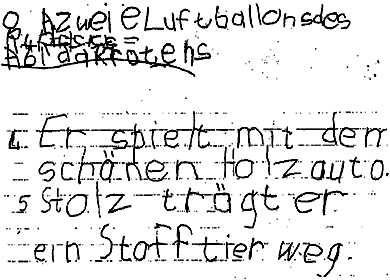Learning Disabilities!
As teachers you can find students with different situations that could affect their learning process...Here, there are some of them including some of the sympthoms, causes and really important information about them!Maybe it could be helpful for you as teacher!!
What is Aphasia?....
Aphasia impairs the ability to speak and understand others, and
 ... Damage to brain tissue areas responsible for language; aphasia may occur suddenly or develop over time, depending on the type and location of brain tissue damage.
... Damage to brain tissue areas responsible for language; aphasia may occur suddenly or develop over time, depending on the type and location of brain tissue damage.


most people with aphasia experience difficulty reading and writing.
Some of the causes are:
 ... Damage to brain tissue areas responsible for language; aphasia may occur suddenly or develop over time, depending on the type and location of brain tissue damage.
... Damage to brain tissue areas responsible for language; aphasia may occur suddenly or develop over time, depending on the type and location of brain tissue damage.
Dyslexia
Even before kindergarten, a kid who has dyslexia usually has trouble with letters and sounds. Later, a teacher might say that the kid is smart, but doesn't seem to be getting the hang of reading. Other times, it's a parent who notices the kid is struggling. The best thing to do is to go to a specialist who can help figure out what's wrong.
A specialist in learning disabilities knows a lot about learning problems that kids have and what to do about them. During a visit with a specialist, a kid might take some tests. But the idea isn't to get a good grade; it's to spot problems. Discovering a learning disability is the first step toward getting help that will make it easier for the kid to learn.
Kids who have dyslexia might get frustrated, angry, or sad because reading and spelling are so hard. They may not like being in a different reading group than their friends or having to see a special reading tutor.
But getting this help is so important and will help them go on to do great things in life. Some of the most creative and successful people have dyslexia, but it didn't stop them from chasing their dreams!
Dysgraphia
What is dysgraphia?
Dysgraphia is a learning disability that affects writing abilities. It can manifest itself as difficulties with spelling, poor handwriting and trouble putting thoughts on paper.
What are the warning signs of dysgraphia?
Just having bad handwriting doesn't mean a person has dysgraphia. Since dysgraphia is a processing disorder, difficulties can change throughout a lifetime. However since writing is a developmental process -children learn the motor skills needed to write, while learning the thinking skills needed to communicate on paper - difficulties can also overlap.
If a person has trouble in any of the areas below, additional help may be beneficial.
- Tight, awkward pencil grip and body position
- Illegible handwriting
- Avoiding writing or drawing tasks
- Tiring quickly while writing
- Saying words out loud while writing
- Unfinished or omitted words in sentences
- Difficulty organizing thoughts on paper
- Difficulty with syntax structure and grammar
- Large gap between written ideas and understanding demonstrated through speech.
What strategies can help?
There are many ways to help a person with dysgraphia achieve success. Generally strategies fall into three categories:
- Accommodations: providing alternatives to written expression
- Modifications: changing expectations or tasks to minimize or avoid the area of weakness
- Remediation: providing instruction for improving handwriting and writing skills
Each type of strategy should be considered when planning instruction and support. A person with dysgraphia will benefit from help from both specialists and those who are closest to the person. Finding the most beneficial type of support is a process of trying different ideas and openly exchanging thoughts on what works best.

Excellent song, I like it, also your blog is nice, congrats!!
ReplyDelete